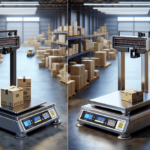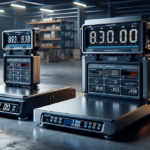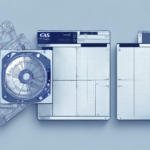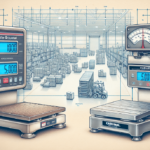Ohaus D51XW vs Salter Brecknell PS1000: Comprehensive Comparison
Choosing the right scale for your business is a critical decision that can significantly impact your operations. When it comes to weighing equipment, two popular options are the Ohaus D51XW and the Salter Brecknell PS1000. This comparison delves into various factors to help you make an informed decision.
Overview of Ohaus D51XW and Salter Brecknell PS1000
The Ohaus D51XW is a legal-for-trade scale designed for precision, offering fast and accurate measurements up to 50 kg. Key features include a backlit LCD display, stainless steel platform, and a battery life indicator. Connectivity options such as Ethernet, RS232, and USB enhance its versatility. For more details, visit the Ohaus D51XW product page.
Conversely, the Salter Brecknell PS1000 is built for industrial applications, featuring a bright LED display, a large stainless steel platform, and a substantial capacity of up to 1,000 kg. Optional ramps and mounting brackets add to its adaptability. Additional information can be found on the Salter Brecknell PS1000 product page.
Both scales boast durability, with the Ohaus D51XW featuring a rugged design suitable for harsh industrial environments, while the Salter Brecknell PS1000 is constructed from heavy-duty materials to handle heavy loads and frequent use. Additional features like automatic zero tracking, overload protection, and easy-to-clean surfaces ensure ease of use and maintenance for both models.
Key Features of Ohaus D51XW and Salter Brecknell PS1000
- Ohaus D51XW:
- High-impact ABS housing
- Front and rear overload protection
- All-stainless-steel design
- Easy-to-operate and clean keypad
- Application modes: dynamic weighing, checkweighing, percent weighing, display hold
- Salter Brecknell PS1000:
- Large, durable platform
- Low profile design
- Adjustable leveling feet
- Automatic zero tracking
- IP67 rated for protection against dust and water
Both the Ohaus D51XW and Salter Brecknell PS1000 offer high accuracy and reliability, making them suitable for various applications. The Ohaus D51XW boasts a readability of 0.5g with a maximum capacity of 50kg, while the Salter Brecknell PS1000 offers a readability of 0.2kg and a maximum capacity of 1,000kg. These specifications make them ideal for use in warehouses, factories, and other industrial settings where precision and durability are paramount.
Pros and Cons of Ohaus D51XW and Salter Brecknell PS1000
Ohaus D51XW offers high-end accuracy, speed, and robust connectivity options. However, it comes at a higher price point and has a lower capacity compared to the PS1000. Salter Brecknell PS1000, on the other hand, provides ruggedness and simplicity, making it ideal for harsh industrial environments. Its main drawback is the relatively lower precision compared to the Ohaus D51XW.
Key considerations:
- Ohaus D51XW: Portable with a built-in rechargeable battery, suitable for various locations.
- Salter Brecknell PS1000: Higher capacity for larger industrial applications, durable construction reduces long-term repair costs.
Ultimately, the choice between the two scales hinges on your specific business needs and requirements.
Accuracy Comparison: Ohaus D51XW vs Salter Brecknell PS1000
The Ohaus D51XW excels in accuracy with a readability of up to 0.01 kg, making it suitable for intricate measurements required in laboratory settings. In contrast, the Salter Brecknell PS1000 offers a readability of 0.2 kg, which is generally sufficient for most industrial and everyday applications.
Maintaining accuracy is essential for both scales. Regular calibration and proper maintenance, as per the manufacturer's guidelines, ensure consistent and precise measurements over time. Refer to the Ohaus calibration guidelines and Salter Brecknell maintenance procedures for detailed instructions.
Ease of Use: Ohaus D51XW vs Salter Brecknell PS1000
While both scales are user-friendly, the Ohaus D51XW offers more advanced features that may require a learning curve, such as multiple application modes and connectivity options. These features, however, provide significant benefits for data management and precision tasks.
The Salter Brecknell PS1000 maintains simplicity with single-button operation and tactile keys, complemented by a clear LED display. Its intuitive design allows for quick and easy operation, making it ideal for users who prefer straightforward functionality.
Performance Comparison: Ohaus D51XW vs Salter Brecknell PS1000
Performance-wise, the Ohaus D51XW slightly outperforms the PS1000 in both speed and accuracy. It can measure up to 20% faster while maintaining high precision. Additionally, its multiple connectivity options facilitate efficient data management, integrating seamlessly with industry-standard systems like ISO 9001 quality management protocols.
The Salter Brecknell PS1000 delivers consistent and reliable measurements, even in challenging conditions, thanks to its IP67 rating. Its compact design and low profile make it suitable for smaller workspaces and ease the loading and unloading of heavy items.
Pricing Comparison: Ohaus D51XW vs Salter Brecknell PS1000
The Ohaus D51XW is priced higher due to its advanced features and superior accuracy. This investment is justifiable for businesses where precision and speed are critical. On the other hand, the Salter Brecknell PS1000 is a cost-effective option for industrial businesses seeking reliability without the need for high-end precision.
Considerations:
- Ohaus D51XW: Higher upfront cost but offers greater durability and advanced features, potentially reducing long-term expenses.
- Salter Brecknell PS1000: Budget-friendly with a straightforward user interface, ideal for businesses with simpler weighing needs.
Which Scale is More Suitable for Your Business Needs?
Your choice between the Ohaus D51XW and Salter Brecknell PS1000 should be guided by your specific business requirements:
- Ohaus D51XW: Best for businesses requiring high accuracy, speed, and portability, such as laboratories or operations needing precise measurements.
- Salter Brecknell PS1000: Ideal for industrial settings that demand durability and the ability to handle heavy loads without the need for ultra-precision.
Additionally, consider the scale's capacity and durability in relation to your operational environment to ensure long-term satisfaction and efficiency.
User Reviews of Ohaus D51XW and Salter Brecknell PS1000
Users of the Ohaus D51XW commend its accuracy and speed, highlighting minimal calibration errors and reliable performance. However, some users find the advanced features complex, requiring a steeper learning curve.
Owners of the Salter Brecknell PS1000 appreciate its rugged design and user-friendly interface, noting its ease of installation and maintenance in industrial settings. Nonetheless, a few users have expressed concerns over slower response times compared to more advanced models.
Warranty and Customer Support Comparison
Both scales come with manufacturer warranties:
- Ohaus D51XW: One-year warranty with an option to purchase an extended warranty for additional coverage.
- Salter Brecknell PS1000: Two-year warranty covering manufacturing defects.
Customer support is robust for both brands. Ohaus offers a variety of support channels including live chat, email, and phone, with many customers praising their knowledgeable staff. Salter Brecknell provides phone and email support, though some users have reported longer wait times and varying levels of responsiveness.
Note that warranties typically cover manufacturing defects and exclude damage from misuse or mishandling. It's advisable to understand the warranty terms fully and consider extended coverage if necessary.
Final Verdict: Which Scale Should You Choose?
Both the Ohaus D51XW and Salter Brecknell PS1000 are reputable and reliable scales tailored to different needs:
- Choose Ohaus D51XW if:
- Your business demands high accuracy and speed.
- You operate in environments requiring precise measurements, such as laboratories.
- You value advanced connectivity and data management features.
- Choose Salter Brecknell PS1000 if:
- You require a durable scale for heavy industrial use.
- Your operations involve weighing larger items up to 1,000 kg.
- You prefer a straightforward, cost-effective solution without the need for high-end precision.
Ultimately, the decision should be based on your specific business needs, budget, and the operational environment in which the scale will be used. Assessing these factors will ensure you select the scale that best aligns with your business objectives.






















